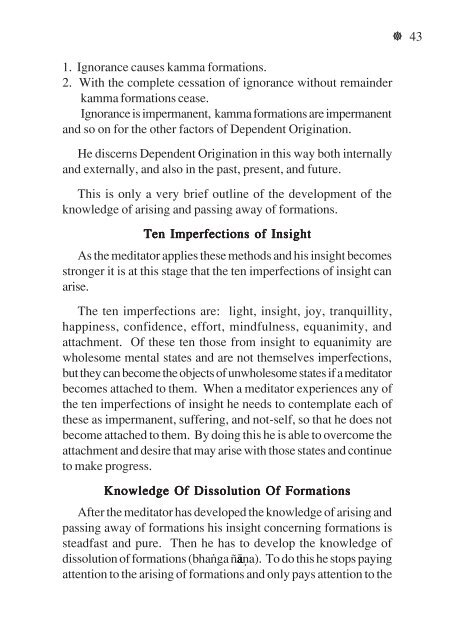The Practice Which leads to Nibbana - A Buddhist Library
The Practice Which leads to Nibbana - A Buddhist Library
The Practice Which leads to Nibbana - A Buddhist Library
Create successful ePaper yourself
Turn your PDF publications into a flip-book with our unique Google optimized e-Paper software.
1. Ignorance causes kamma formations.2. With the complete cessation of ignorance without remainderkamma formations cease.Ignorance is impermanent, kamma formations are impermanentand so on for the other fac<strong>to</strong>rs of Dependent Origination.He discerns Dependent Origination in this way both internallyand externally, and also in the past, present, and future.This is only a very brief outline of the development of theknowledge of arising and passing away of formations.Ten Imperfections of InsightAs the medita<strong>to</strong>r applies these methods and his insight becomesstronger it is at this stage that the ten imperfections of insight canarise.<strong>The</strong> ten imperfections are: light, insight, joy, tranquillity,happiness, confidence, effort, mindfulness, equanimity, andattachment. Of these ten those from insight <strong>to</strong> equanimity arewholesome mental states and are not themselves imperfections,but they can become the objects of unwholesome states if a medita<strong>to</strong>rbecomes attached <strong>to</strong> them. When a medita<strong>to</strong>r experiences any ofthe ten imperfections of insight he needs <strong>to</strong> contemplate each ofthese as impermanent, suffering, and not-self, so that he does notbecome attached <strong>to</strong> them. By doing this he is able <strong>to</strong> overcome theattachment and desire that may arise with those states and continue<strong>to</strong> make progress.Knowledge Of Dissolution Of FormationsAfter the medita<strong>to</strong>r has developed the knowledge of arising andpassing away of formations his insight concerning formations issteadfast and pure. <strong>The</strong>n he has <strong>to</strong> develop the knowledge ofdissolution of formations (bhaºga –Œöa). To do this he s<strong>to</strong>ps payingattention <strong>to</strong> the arising of formations and only pays attention <strong>to</strong> thew 43



![Path of Freedom [Vimuttimagga]](https://img.yumpu.com/49098667/1/177x260/path-of-freedom-vimuttimagga.jpg?quality=85)






